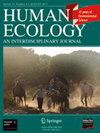珊瑚礁修复计划能否促进环保态度的转变?印度尼西亚巴厘岛北部农村渔民社区的案例研究
IF 1.7
3区 社会学
Q1 ANTHROPOLOGY
引用次数: 0
摘要
目前,评估珊瑚栖息地增强和底栖生物和流动种群恢复计划对其所在社区的态度(以及随后的行为)影响的生态潜力的研究有限。我们的定性研究调查了珊瑚礁恢复方案对印度尼西亚巴厘岛北部农村渔业社区当地环境态度的影响。我们在非政府组织“北巴厘岛珊瑚礁保护”(Yowana Bhakti Segara)所在的天亚村对个人和多方利益相关者焦点小组(n = 31)进行了半结构化访谈。我们的研究结果强调了影响环境行为的几个因素,包括珊瑚礁的感知价值(例如,捕捞产量的变化),支持珊瑚礁恢复的驱动因素(例如,当地领导人的影响)和支持珊瑚礁恢复的障碍(例如,缺乏投资)。总体而言,我们的数据表明,修复方案通过改善废物管理、增加对修复工作的支持和制定新的环境法规,在社区内影响了积极的环境态度。基于我们的研究结果,我们提出了五项建议:(1)在社区内继续进行环境教育,(2)加强法规和改进执法,(3)增加对废物管理和生态旅游的财政和后勤支持,(4)继续建设和部署人工鱼礁,确保遵循“最佳实践”建议,以及(5)利用当地领导人的影响力创造积极的环境行为。本文章由计算机程序翻译,如有差异,请以英文原文为准。
Can Coral Reef Restoration Programmes Facilitate Changes in Environmental Attitudes? A Case Study on a Rural Fisher Community in North Bali, Indonesia
Abstract There is currently limited research assessing the ecological potential of coral restoration programmes of habitat enhancement and restoration of benthic and mobile populations for influencing the attitudes (and subsequent behaviours) of the communities where they are based. Our qualitative study investigated the impact of a coral reef restoration programmes on local environmental attitudes in a rural fishing community in north Bali, Indonesia. We conducted semi-structured interviews with individuals and multi-stakeholder focus groups (n = 31) in Tianyar Village, where the NGO ‘North Bali Reef Conservation’ (‘Yowana Bhakti Segara’) was based. Our results highlight several factors that influenced environmental behaviours, including perceived value of coral reefs (e.g.,changes in fishing yield), drivers of support for coral reef restoration (e.g., local leaders’ influence) and barriers to coral reef restoration support (e.g., lack of investment). Overall, our data indicate that the restoration programme has influenced positive environmental attitudes within the community through improvements in waste management, increased support for restoration work, and the establishment of new environmental regulations. Based on our results, we make five recommendations: (1) continuing environmental education within the community, (2) strengthening regulations and improving enforcement, (3) increasing financial and logistical support for waste management and ecotourism, (4) continuing the construction and deployment of artificial reefs, ensuring ‘best practice’ recommendations are followed, and (5) utilising the influence of local leaders to create positive environmental behaviours.
求助全文
通过发布文献求助,成功后即可免费获取论文全文。
去求助
来源期刊

Human Ecology
Multiple-
CiteScore
3.10
自引率
5.00%
发文量
64
期刊介绍:
The theoretical orientation of Human Ecology emphasizes the problem-solving significance of human culture and behavior, from food procurement to systems defining kinship—not to mention political and religious life. The perspective generally embraced here is that human ecology is part and parcel of the larger field of ecology and not simply analogous to it. Contributions to Human Ecology emphasize the complex ways in which humans shape and in turn are shaped by their environment. Original articles, research reports, and brief communications based on empirical research are welcome from fields as diverse as environmental impact studies, resource or habitat maintenance, health and nutrition, risk management, land use history—to name a few. Disciplines commonly represented include anthropology, biological, life and health sciences, geography, and sociology. The journal is peer reviewed. A book review section appears in each issue.
 求助内容:
求助内容: 应助结果提醒方式:
应助结果提醒方式:


